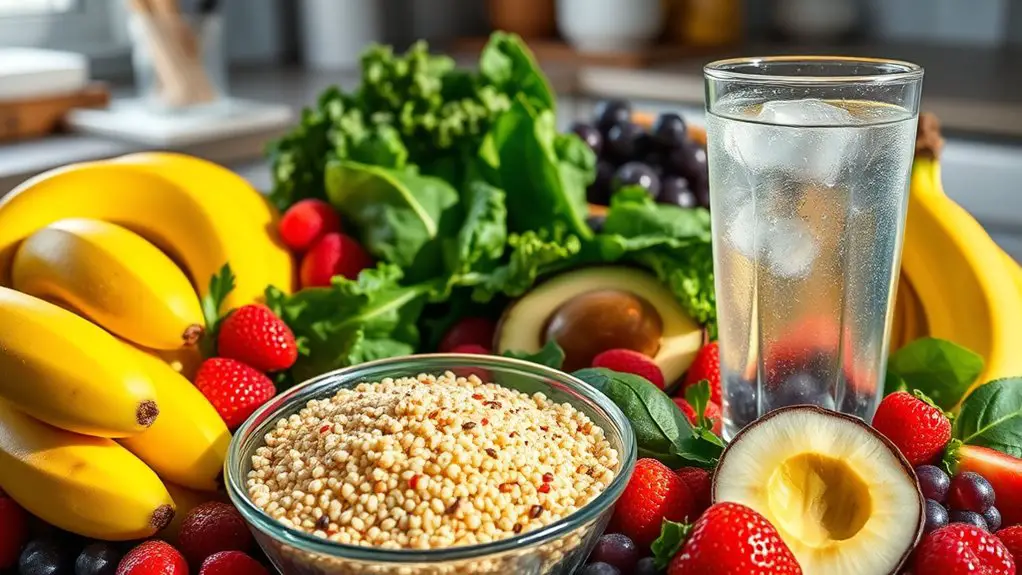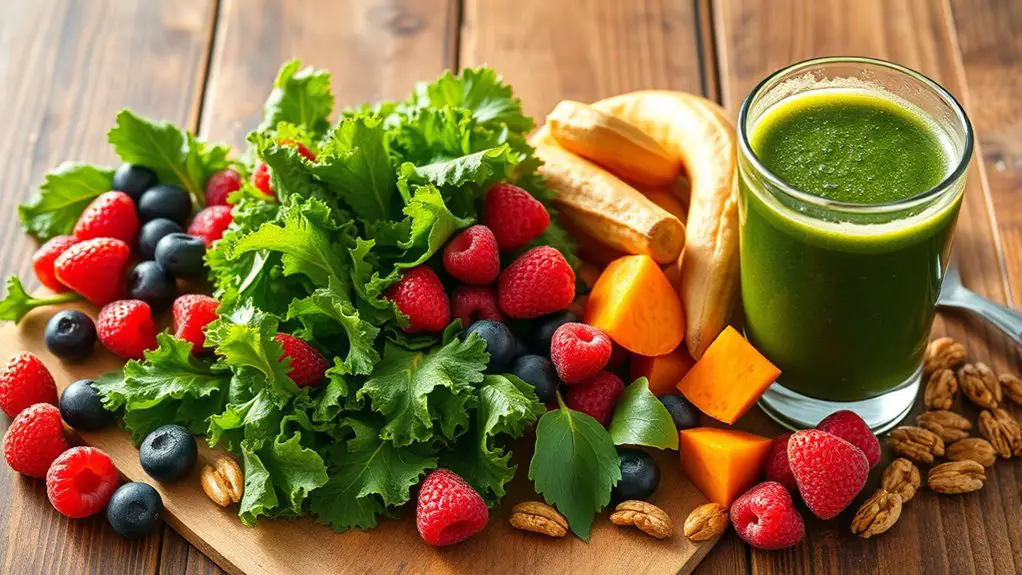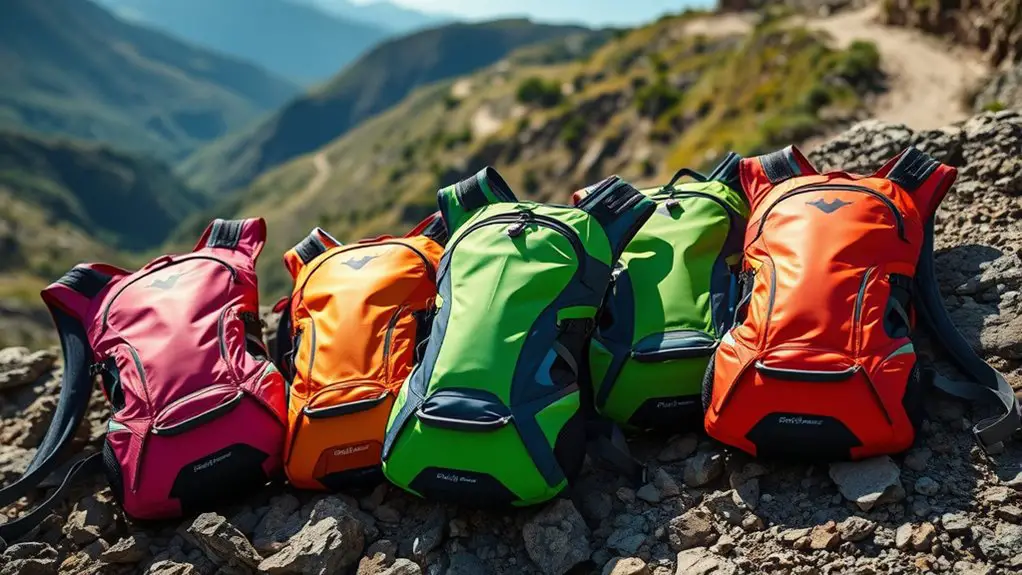To fuel your body for high-intensity workouts, balance your intake of carbohydrates, proteins, and fats. Eat whole grains or fruits for energy about 30-60 minutes before your session. Focus on hydration to prevent fatigue—drink water before, during, and after. Post-workout, refuel with lean proteins and carbs within 30 minutes to aid recovery. Timing your meals properly can greatly enhance your performance. There's more to optimizing your nutrition, so keep exploring for the best results.
Understanding Macronutrients for Optimal Performance
How do you guarantee your body has what it needs for peak performance during workouts? Understanding macronutrients is key. These nutrients—proteins, carbohydrates, and fats—fuel your body, giving you the energy and strength to push limits.
Proteins help build and repair muscle, essential for those intense sessions. Carbohydrates are your body's primary energy source; they'll keep you moving and focused. Don't underestimate fats, either. They provide long-lasting energy, especially during prolonged workouts.
Balancing these macronutrients allows you to release your potential. Instead of feeling weighed down, you'll experience freedom in every movement. When you know how to combine these nutrients effectively, you empower yourself to tackle any challenge. Individual nutritional needs vary, so it's important to tailor your macronutrient intake based on your specific training demands.
Pre-Workout Nutrition: What to Eat Before Your Session
When you're gearing up for a workout, what you eat beforehand can make all the difference in your performance. You want to fuel your body with the right nutrients to maximize energy and focus. Here's what to reflect on:
- Carbohydrates: They're your main source of energy. Opt for whole grains, fruits, or oats to keep you going strong.
- Protein: A little protein helps with muscle repair and growth. Think Greek yogurt or a protein shake.
- Healthy Fats: Don't shy away from good fats! Avocado or nuts can provide lasting energy without weighing you down.
Aim to eat your pre-workout meal about 30-60 minutes before you hit the gym. This timing allows your body to digest and convert those nutrients into energy, so you can release your full potential during your session. Enjoy the freedom of movement fueled by your choices! Additionally, incorporating hydration and its role in your pre-workout routine can enhance overall performance and prevent fatigue.
The Importance of Hydration During Intense Workouts
Fueling your body with the right nutrients before a workout sets the stage for success, but hydration is just as important during those intense sessions. When you're pushing your limits, your body loses fluids through sweat, and staying hydrated keeps your performance sharp. Dehydration can lead to fatigue, decreased strength, and even muscle cramps. You don't want to cut your workout short because you didn't drink enough water.
Aim to sip water before, during, and after your workout to maintain that energy flow. If you're exercising for more than an hour, consider electrolyte drinks to replenish lost minerals. Listen to your body—if you feel thirsty, it's time to hydrate. Monitoring your hydration status is crucial to ensure you don't let dehydration hold you back from the freedom of movement and endurance you crave. Prioritizing hydration elevates not just your workout but your overall experience, letting you release your full potential.
Post-Workout Recovery: Refueling Your Body
After a challenging workout, your body craves the right nutrients to recover and rebuild. Refueling isn't just about replenishing energy; it's about giving your muscles what they need to thrive. Here's what to focus on:
- Protein: It's essential for muscle repair. Think lean meats, eggs, or plant-based options like beans and lentils.
- Carbohydrates: They help restore glycogen levels. Opt for whole grains, fruits, or starchy veggies to fuel your next session.
- Healthy Fats: These support overall recovery. Include sources like avocados, nuts, and olive oil.
Don't underestimate the power of a balanced post-workout meal. Enjoying a delicious mix of these nutrients not only feels rewarding but also sets you up for your next challenge. Listening to your body is crucial, as it knows what it needs to feel free and energetic again, especially when it comes to adequate protein intake for optimal recovery!
Timing Your Meals for Maximum Energy Output
To optimize your energy levels during workouts, understanding meal timing is essential. You want to fuel your body just right so you can release your full potential. Aim to eat a balanced meal containing carbs, protein, and healthy fats about 2-3 hours before you hit the gym. This'll give your body enough time to digest and convert that food into energy.
If you're running short on time, a quick snack 30-60 minutes prior, like a banana or a yogurt, can do wonders. It'll provide that immediate energy boost you need without weighing you down.
Post-workout, don't skip out on refueling! A mix of protein and carbs within 30 minutes helps your muscles recover and restores your energy. Additionally, investing in pre-workout nutrition can significantly enhance your endurance and strength. By mastering your meal timing, you're not just working out; you're thriving in every session. Enjoy the freedom that comes from feeling energized and ready to conquer your fitness goals!
Frequently Asked Questions
How Do Supplements Fit Into My Workout Nutrition Plan?
Think of supplements as your workout's secret sauce. They can enhance your nutrition plan, filling gaps in your diet. Just remember, they're not a replacement; balance your meals and let your body thrive.
Can I Eat Junk Food and Still Perform Well?
You can indulge in junk food occasionally, but it won't fuel your performance. For ideal results, balance treats with nutritious meals. Your body deserves better to thrive during those intense workouts you love.
What Are the Best Snacks for Energy During Workouts?
For energy during workouts, you can grab quick snacks like bananas, energy bars, or nuts. They'll keep you fueled without weighing you down, letting you enjoy your freedom to push through your sessions effortlessly.
Should I Avoid Fats Before High-Intensity Workouts?
You shouldn't completely avoid fats before workouts; just choose wisely. Healthy fats can provide sustained energy, but heavy meals might slow you down. Balance is key, so listen to your body and find what works best.
How Does Caffeine Affect Workout Performance and Recovery?
Caffeine can either energize your workout or leave you jittery. It boosts endurance and reduces perceived effort, helping you push harder. Just remember, moderation's key; too much can disrupt your focus and recovery.




